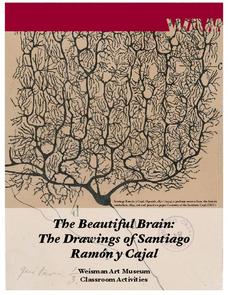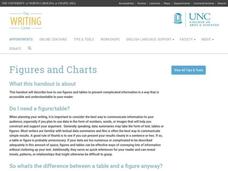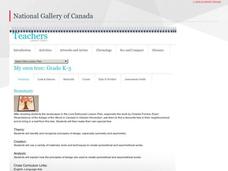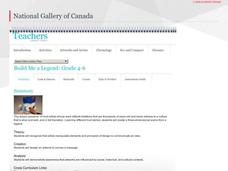Curated OER
Poetry of War and Peace
Students read and discuss the poem "In Flanders Fields," then write poems evoking images of peacetime. They practice the techniques of writing poetry while using textual imagery to create visual images.
National Gallery of Canada
Lumps, Bumps, Gritty, and Soft!
Texture can really add to a work of art. Explore texture through observation and practice. Learners view and discuss works of art by M.C. Escher. They then create their own texture samplers with six different materials.
Curated OER
Birch Bark Biting
Fifth graders create birch bark biting art pieces. In this aboriginal art lesson, 5th graders produce art using birch bark. Students present their art pieces and explain their designs.
Curated OER
Terrific Tessellations
Students create to pieces of artwork using two primary colors and tessellation techniques. This is an excellent lesson that can be accomplished using standard art techniques or educational software such as Adobe Photoshop or Microsoft...
Art Institute of Chicago
Color Combinations
Explore color through an examination of pointillism and light. Class members view Georges Seraut's famous painting on a computer, zooming in and out to see the details and effects of the technique. They then cover how light and color are...
Media Smarts
Teaching TV: Television Techniques
As part of a five-lesson unit on how television uses technology and film techniques to communicate meaning, elementary students create their own media productions that demonstrate their understanding of these concepts.
Akron Art Museum
Storytelling Resist
The illustrations of Ezra Jack Keats in The Snowy Day inspire young artists to examine shapes in illustrations and to use these shapes to create their own watercolor resist painting.
PBS
Women's History: Glass Windows; Glass Ceilings
Discover stories about women's history in beautiful stained glass windows. The second in a three-part series teaches scholars about a famous artistic style of stained glass windows and the influential women that used art to impact...
University of Minnesota
Beautiful Brain: Strangest Dream
Do words change or add meaning or interest to a work of art? The final lesson in a four-part series on the beautiful brain as a work of art focuses on art analysis. Scholars write a story about exploring art from the inside. Reflections...
Novelinks
Zach’s Lie: Guided Imagery
Close your eyes and picture a time where you decided to tell the truth to someone. What were you wearing? How did you feel? Such prompts begin a guided imagery activity for Zach's Lie. Directions for creating an environment conducive to...
University of North Carolina
Figures and Charts
Sometimes words aren't the best way to get information across to the reader. The eighth handout in the 24-part Writing the Paper series describes different type of figures and charts to display complex information in a paper....
Tayasui.com
Drawing with Carl
Who is Carl? Carl is a little monster that will help your learners draw and create in any way imaginable. Get those kids to activate creative and imaginative thinking skills with a really fun app. There are endless options that can...
National Gallery of Canada
Picture This!
Introduce your class to Inuit prints and use these artworks as inspiration for a printmaking activity. Pupils make stories to go along with the images and then come up with their own heroic moments to illustrate. They take moments from...
National Gallery of Canada
Reading Sculptures
Consider the elements and principles of design closely while examining works of art. Learners select an image from the provided pieces to write about in relation to the elements and principles of design. They then sketch and sculpt their...
National Gallery of Canada
Build a Neighbourhood
What's special about your neighborhood? Build one with your class to find out. Individuals create their dream homes that, when completed, will be placed together around a green space in order to create a neighborhood. Learners also...
National Gallery of Canada
The Changing Composition
Play with dimensions and practice making a two-dimensional scene look three-dimensional. Class members view pieces of art and then make their own scenes by layering different materials and drawing in details. Check out all the tabs for...
National Gallery of Canada
My Own Tree
Nature contains both symmetry and asymmetry. Have your young artists examine symmetry and asymmetry in their own surroundings. After viewing works of art, pupils find trees in their neighborhoods and determine if they...
National Gallery of Canada
Build Me a Legend
Legends are full of imagery and action. Transfer a scene from a legend to a three-dimensional art piece. Class members first view Inuit art and discuss legends. They then build scenes that include action, setting, and characters.
National Gallery of Canada
Mastering One-Point Perspective
Cover one-point perspective through observation and practice. Class members examine several works of art that use one-point perspective, look at magazine images to find the vanishing points and horizon lines, and draw their own city...
Curated OER
Art Basics Scavenger Hunt
Hand out this worksheet and lead your class on a scavenger hunt. Pupils look for examples of shape, form, balance, pattern, perspective, space, and depth. They draw and write about the examples they've found. A great resource to add...
National Gallery of Canada
My World
Art can tell viewers about an artist's personality and background. Have your learners look at Inuit art and consider subject matter and how it relates to the artist and his or her world. The related art project requires pupils to create...
National Gallery of Canada
My Own Blanket
Invite your young artists to design blankets that express their own identities. Learners examine various pieces of art before brainstorming a few things that represent their identities. They use these ideas, in addition to symmetry and...
Education.com
Pablo Picasso
Introduce your class to one of the most famous artists of the twentieth century. After reading a brief biography of Pablo Picasso, pupils create their own collages on the next page on the theme of music.
Curated OER
Art Savers
Need a cheap way to get all those fabulous paintings, collages, and drawings home? Learners use old paper towel tubes to create a handy art transportation device.

























